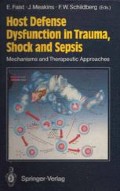Abstract
The nucleoside adenosine (ADO) has been shown to inhibit several leukocyte functions, such as the production of superoxide anions, degranulation, adherence, and cell-mediated cytotoxicity, and can enhance the chemotactic response of polymorphonuclear leukocytes (PMNL). These pharmacodynamic effects are also shared by pentoxifylline (PTX). ADO acts via specific receptors on the outer surface of the PMNL leading to the activation of the adenylate cyclase system. In contrast, the action of PTX has not yet been fully understood. In general, two modes of action might be considered in the inhibition of leukocyte functions. While the alkylxanthine PTX could act as an inhibitor of phosphodiesterases, it is also likely that PTX interferes with the specific ADO receptors thereby increasing intracellular cyclic adenosine monophosphate (cAMP). This latter possibility was supported by the findings that the specific ADO receptor antagonist BW A1433U was able to block PTX in restoring the chemotactic response of human PMNL after inhibition by tumor necrosis factor a (TNF-a) [12]. In order to elucidate these mechanisms, the influence of the combined action of PTX and ADO on the superoxide anion production was investigated in formyl-methionyl-leucyl-phenylalanine (FMLP)-stimulated PMNL. The pharmacological analysis [8] of the dose-response curves of ADO and PTX provide insight into the type of action of both substances. In addition, the effect of the ADO receptor antagonist 8-phenyltheophylline (8-PT) was compared with the ADO- and PTX-mediated inhibition.
Access this chapter
Tax calculation will be finalised at checkout
Purchases are for personal use only
Preview
Unable to display preview. Download preview PDF.
References
Bardenheuer H, Forst H, Haller M, Peter K (1990) Influence of improved tissue oxygenation on plasma adenosine in septic patients. Intensive Care Med 16:S36
Cronstein Bn, Rosenstein ED, Kramer SB, Weissman G, Hirschhorn R (1985) Adenosine, a physiologic modulator of superoxide anion generation by human neutrophils. Adenosine acts via an A2 receptor on human neutrophils. J Immunol 135:1366–1371
Hand WL, Butera ML, King-Thompson NL, Hand DL (1989) Pentoxifylline modulation of plasma membrane functions in human polymorphonuclear leukocytes. Infect Immun 57:3520–3526
Herrmann R (1988) Pharmakokinetik des Pentoxifyllins. In: Senn E, Ernst E (eds) Pharmacological and physical therapy of peripheral vascular disease. Zuckerschwerdt, München, 91–97
Kenakin TP (1984) The classification of drugs and drug receptors in isolated tissue. Pharmacol Rev 36:165–209
Nielson CP, Crowley JJ, Morgan ME, Vestal RE (1988) Polymorphonuclear leukocyte inhibition by therapeutic concentrations of theophylline is mediated by cyclic-3’, 5’-adenosine monophosphate. Am Rev Respir Dis 137:25–30
Parsons WJ, Raukumar V, Stiles GL (1988) Isobutylmethylxanthine stimulates adenylate cyclase by blocking the inhibitory protein Gi. 34:37–41
Pch G (1981) Quantitative Ermittlung potenzierender oder hemmender Kombinationswirkungen gleichsinnig wirkender Pharmaka. Drug Res 31:1135–1140
Smellie FW, Davis CW, Daly JW, Wells JN (1979) Alkylxanthines: inhibition of adenosine-elicited accumulation of cyclicAMP in brain slices and of brain phosphodiesterase activity. Life Sci 24:2475–2482
Stevens P, Hong D (1984) The role of myeloperoxidase and superoxide anoin in the luminol-and lucigenin-enhanced chemiluminescence of human neutrophils. Microchem J 30:135–146
Sullivan GW, Carper HT, Novik WJ, Mandell GL (1988) Inhibition of the inflammatory action of interleukin 1 and tumor necrosis factor (alpha) on neutrophil funciton by pentoxifylline. Infect Immun 56:1722–1729
Sullivan GW, Linden J, Hewlett EL, Carper HT, Hylton JB, Mandell GL (1990) Adenosine and related compounds conteract tumor necrosis factor-α inhibition of neutrophil migration: implication of a novel cAMP-independent action on the cell surface. J Immunol 145:1537–1544
Thiel M, Bardenheuer H (1989) Effect of adenosine on oxygen free radical production in human polymorphonuclear leukocytes. Ann Nutr Metab 33:228–229
Author information
Authors and Affiliations
Editor information
Editors and Affiliations
Rights and permissions
Copyright information
© 1993 Springer-Verlag, Berlin Heidelberg
About this chapter
Cite this chapter
Thiel, M., Bardenheuer, H., Madler, C., Peter, K. (1993). Interaction of Pentoxifylline and Adenosine in the Inhibition of Superoxide Anion Production of Human Polymorphonuclear Leukocytes. In: Faist, E., Meakins, J.L., Schildberg, F.W. (eds) Host Defense Dysfunction in Trauma, Shock and Sepsis. Springer, Berlin, Heidelberg. https://doi.org/10.1007/978-3-642-77405-8_49
Download citation
DOI: https://doi.org/10.1007/978-3-642-77405-8_49
Publisher Name: Springer, Berlin, Heidelberg
Print ISBN: 978-3-642-77407-2
Online ISBN: 978-3-642-77405-8
eBook Packages: Springer Book Archive

